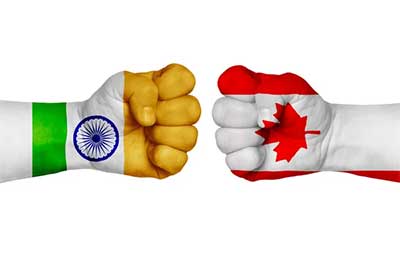Date : 26/10/2023
Relevance –GS Paper 2 – International Relations
Keywords – RAW, VCDR, UNEP FI, KTF
Context
India-Canada bilateral relations, which were already strained, deteriorated further due to Canada's recent allegation that India unilaterally removed the diplomatic immunity of Canadian diplomats stationed in India. Canada contends that this action by India constitutes a breach of international law and the Vienna Convention on Diplomatic Relations (VCDR).
The current India-Canada diplomatic standoff can be traced back to a series of events:
Death of Khalistan Tiger Force (KTF) Chief:
Hardeep Singh Nijjar, a wanted individual according to the Indian government, was killed in a shooting incident outside a gurdwara in Surrey. He was accused of conspiring to kill a Hindu priest in Punjab's Jalandhar, leading to a Rs 10 lakh reward declared on him by India's National Investigation Agency in 2022.
Discussion at G20 Summit:
During the G20 Summit in Delhi, Canadian PM and Indian PM discussed Khalistani extremism. Canada's PM raised concerns about foreign interference in the murder, seeking India's cooperation in the investigation. Conversely, the Indian PM expressed concerns about anti-India activities by extremist elements in Canada.
Accusations and Expulsion of Diplomats:
Canada's PM accused "agents of the Indian government" in the Khalistani leader's killing. Subsequently, Canada expelled the head of India's Research and Analysis Wing (RAW). In retaliation, India summoned the High Commissioner of Canada and expelled a senior Canadian diplomat.
India's Diplomatic Moves:
India invoked the issue of parity in diplomatic representation, urging Canada to withdraw some diplomatic staff. India threatened to remove their immunity if they remained beyond the deadline.
Canada's Latest Accusation:
Canada's PM criticized India's decision to revoke diplomatic immunity for Canadian diplomats, citing violations of the Vienna Convention on Diplomatic Relations (VCDR). He emphasized that India's action contradicted fundamental principles of international law and diplomacy.
Vienna Convention on Diplomatic Relations (VCDR)
The Vienna Convention on Diplomatic Relations (VCDR) serves as a global treaty outlining the guidelines for diplomatic interactions among sovereign nations. It aims to harmonize the interests and needs of host countries (where diplomatic missions are situated) with those of sending states (the nations dispatching diplomatic missions to other countries).
Factual Examination of Canada’s Allegations
Incorrect Claim Regarding Revoked Diplomatic Immunity
India’s Actions and International Law
Contrary to Canada’s accusation, India did not revoke the immunity of Canadian diplomats. Instead, India requested Canada to reduce the size of its mission by recalling several diplomats, based on the principle of parity. While it could be argued that these diplomats might lose their immunity if they stayed despite India’s demand, this consequence would stem from Canada not complying with India’s request, not India’s direct action.
India's actions differ from Canada's claim of revoked diplomatic immunities. India did not declare any diplomats persona non grata. Under Article 9 of VCDR, India, as the receiving state, has the right to do so without having to explain its decision to Canada.
India’s Right to Regulate Diplomatic Presence
Consistency with Parity Clause
India’s Unilateral Decision-Making Authority
Compliance with India’s Diplomatic Relations Act of 1972
India's response aligns with Article 11(1) of VCDR. This provision allows the receiving state to require a mission size it deems reasonable and normal. The interpretation is subjective, empowering India to unilaterally decide what is appropriate based on its domestic circumstances.
India holds the unilateral right to decide, given the significant number of Canadian diplomats in India and their alleged interference in India’s internal affairs. According to Article 41(1) of VCDR, diplomats must refrain from meddling in the receiving state’s internal matters. Any such interference could lead to a breach of VCDR and justify restrictions or withdrawal of diplomatic immunities.
India’s actions align with the Diplomatic Relations Act of 1972, enacted to enforce VCDR. Section 4 of this Act empowers the central government to restrict diplomatic privileges and immunities if a country fails to fulfill its VCDR obligations. Hence, India’s response is well within the framework of both international law and its domestic legislation.
International Precedents Supporting India’s Diplomatic Action
Ceiling Imposed by the UK on Soviet Mission
US Restriction on Iranian Mission (1979)
Estonia and Moldova’s Measures Against Russian Mission
The United Kingdom, in response to inappropriate activities by Russian diplomats, enforced a cap on the Soviet Union’s mission in the UK. This action was substantiated by invoking Article 11 of the VCDR, allowing countries to regulate the size of foreign missions.
In 1979, the United States exercised its authority to limit the number of Iranian diplomats stationed in Washington. This move demonstrated the U.S.’s prerogative to control the diplomatic presence of other nations within its borders.
Recently, Moldova and Estonia compelled Russia to reduce the size of its mission, citing the principle of parity outlined in Article 11 of the VCDR. Moldova accused Russian diplomats of destabilizing internal affairs, while Estonia asserted that Russian diplomats were undermining the nation’s security. Both countries utilized their rights under international law to maintain diplomatic equilibrium.
Conclusion:
India's recent actions align with its international legal obligations. However, the overarching issue lies in the evident lack of trust between Ottawa and New Delhi at present. To mend these strained relations, both nations must actively engage in adopting confidence-building measures. Focusing on allegations of international law violations will only further deteriorate bilateral ties, emphasizing the urgency of fostering trust through constructive initiatives.
Probable Questions for UPSC Mains Exam
- "Examine the India-Canada standoff under the Vienna Convention on Diplomatic Relations. Assess India's actions and propose confidence-building measures." (10 marks, 150 words)
- "Critically analyze India's response to Canada's accusations, citing the Vienna Convention. Recommend steps for trust-building and constructive dialogue." (15 marks, 250 words)
Source – Indian Express







